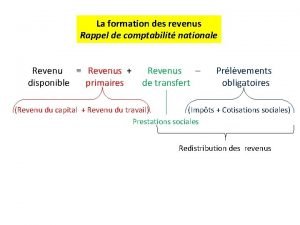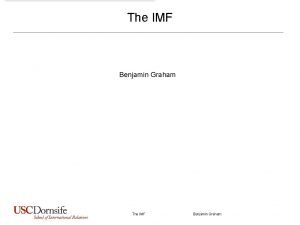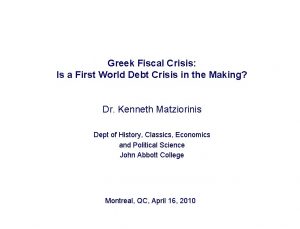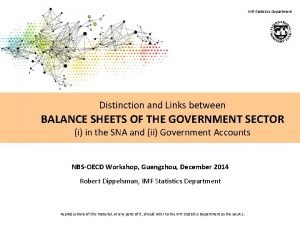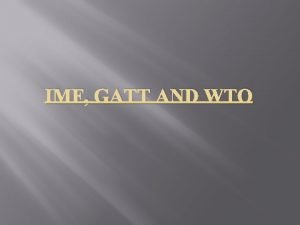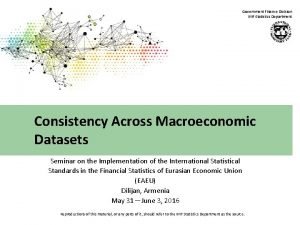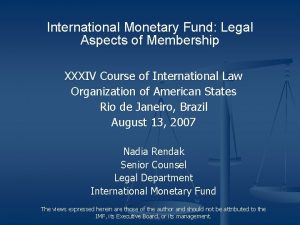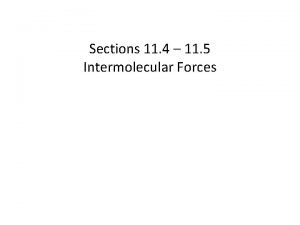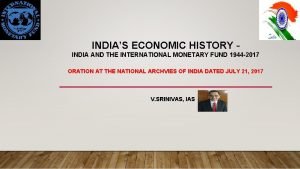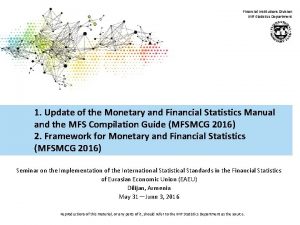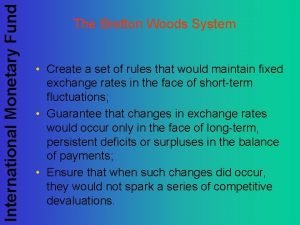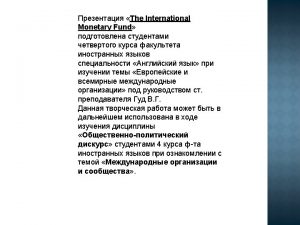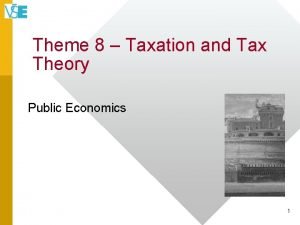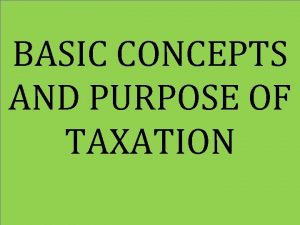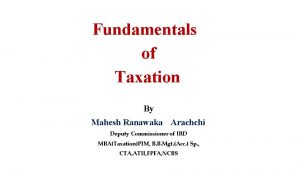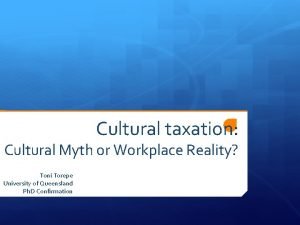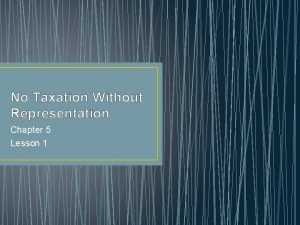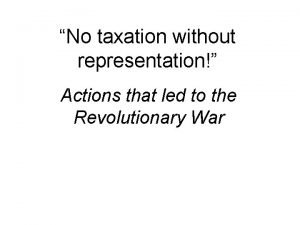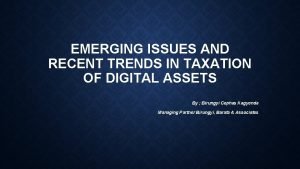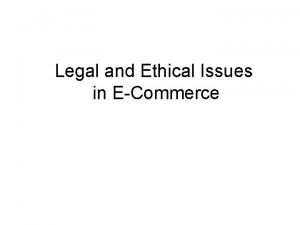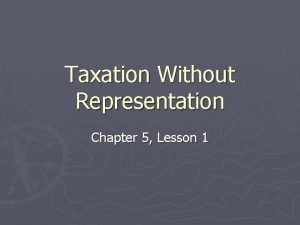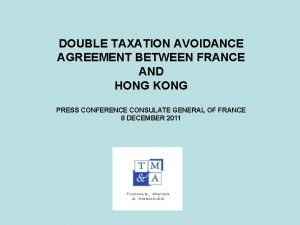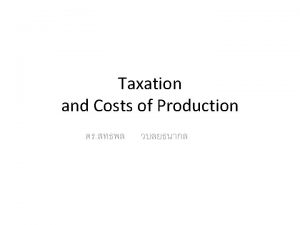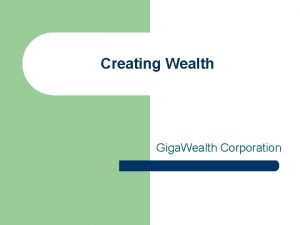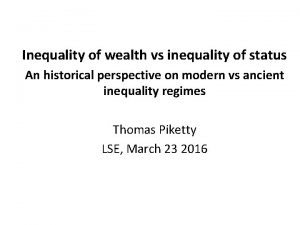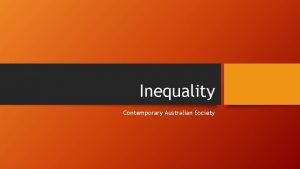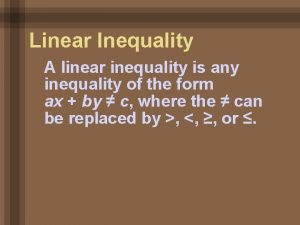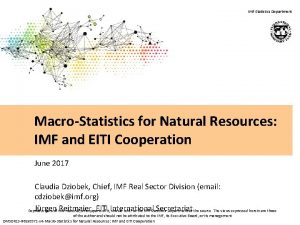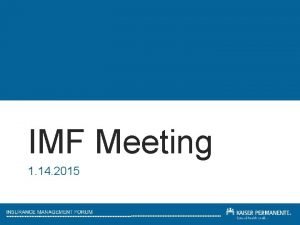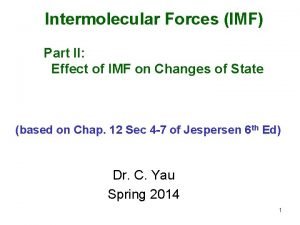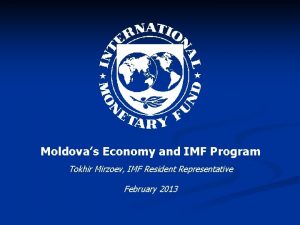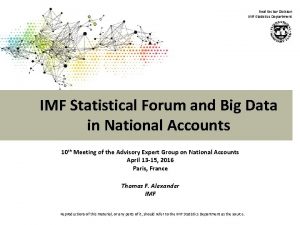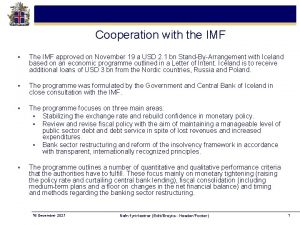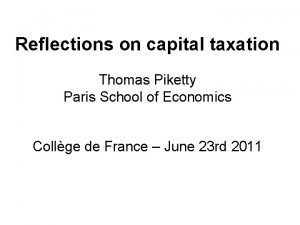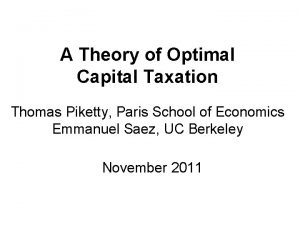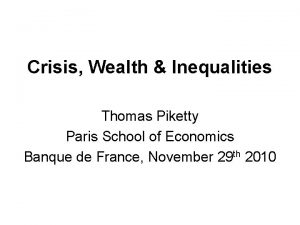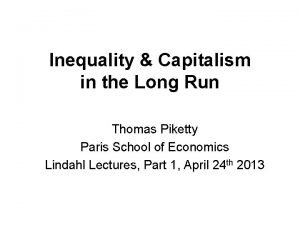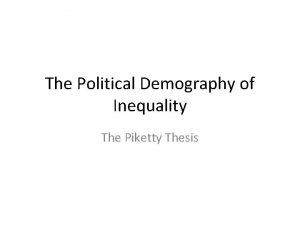Wealth Inequality Taxation T Piketty IMF 27 09








































- Slides: 40

Wealth, Inequality & Taxation T. Piketty, IMF 27 -09 -2012 Supplementary slides



Decomposition results: 1870 -2010 • Annual series for US, Germany, France, UK, 1870 -2010 • Additive vs multiplicative decomposition of wealth accumulation equation into volume vs price effects • Private saving (personal + corporate) vs personal • Private wealth vs national wealth accumulation • Domestic vs foreign wealth accumulation • Main conclusion: over the entire 1910 -2010 period, capital gains wash out; i. e. 1910 -1950 fall in relative asset price compensated by 1950 -2010 (except in Germany, where asset prices seem abnormally low: stakeholder effect? ) • In the long run (1870 -2010 or 1910 -2010), changes in wealth-income ratios are well accounted for by β=s/g










Back to distributional analysis: macro ratios determine who is the dominant social class • 19 C: top successors dominate top labor earners → rentier society (Balzac, Jane Austen, etc. ) • For cohorts born in 1910 s-1950 s, inheritance did not matter too much → labor-based, meritocratic society • But for cohorts born in the 1970 s-1980 s & after, inheritance matters a lot → 21 c class structure will be intermediate between 19 c rentier society than to 20 c meritocratic society – and possibly closer to the former • The rise of human capital & meritocracy was an illusion. . especially with a labor-based tax system



What have we learned? • A world with g low & r>g is gloomy for workers with zero initial wealth… especially if global tax competition drives capital taxes to 0%… especially if top labor incomes take a rising share of aggregate labor income → A world with g=1 -2% (=long-run world technological frontier? ) is not very different from a world with g=0% (Marx-Ricardo) • From a r-vs-g viewpoint, 21 c maybe not too different from 19 c – but still better than Ancien Regime… except that nobody tried to depict AR as meritocratic…

The meritocratic illusion Democracies rely on meritocratic values: in order to reconcile the principle of political equality with observed socioeconomic inequalities, they need to justify inequality by merit and/or common utility • But effective meritocracy does not come naturally from technical progress & market forces; it requires specific policies & institutions • Two (quasi-)illusions: (1) human K didn’t replace financial K (2) war of ages didn’t replace war of classes • « Meritocratic extremism » : the rise of working rich & the return of inherited wealth can seem contradictory; but they go hand in 21 c discourse: in the US, working rich are viewed as the only cure against the return of inheritance – except of course for bottom 90% workers…

• More competitive & efficient markets won’t help to curb divergence forces: (1) Competition and greed fuel the grabbing hand mechanism; with imperfect information, competitive forces not enough to get pay = marginal product; only confiscatory top rates can calm down top incomes (2) The more efficient the markets, the sharper the capital vs labor distinction; with highly developed k markets, any dull successor can get a high rate of return • r>g = nothing to do with market imperfections • Standard model: r = δ+σg > g (Golden rule) → The important point about capitalism is that r is large (r>g → tax capital, otherwise society is dominated by rentiers), volatile and unpredictable (→ financial crisis)

The future of global inequality • Around 1900 -1910: Europe owned the rest of the world; net foreign wealth of UK or France >100% of their national income (>50% of the rest-of-the-world capital stock) • Around 2050: will the same process happen again, but with China instead of Europe? → this is the issue explored in Piketty-Zucman, « Will China Own the World? Essay on the Dynamics of the World Wealth Distribution, 2010 -2050 » , WP PSE 2011 • Bottom line: international inequalities even less meritocratic than domestic inequalities; e. g. oil price level has nothing to do with merit; the fact that Greece pays interest rate r=10% on its public debt has nothing to do with merit; the price system has nothing to do with merit…

• Assume global convergence in per capita output Y & in capital intensity K/Y • With large differences in population & fully integrated K markets & high world rate of return r (low K taxes) Then moderate differences in savings rate (say, s=20% in China vs s=10% in Europe+US, due to bigger pay-as-you-go pensions in Old World, traumatized by past financial crashes) can generate very large net foreign asset positions → under these assumptions, China might own a large part of the world by 2050

• Likely policy response in the West: K controls, public ownership of domestic firms, etc. • But this is not the most likely scenario: a more plausible scenario is that global billionaires (located in all countries… and particularly in tax havens) will own a rising share of global wealth • A lot depends on the net-of-tax global rate of return r on large diversified portfolios • If r=5%-6% in 2010 -2050 (=what we observe in 1980 -2010 for large Forbes fortunes, or Abu Dhabi sovereign fund, or Harvard endowment), then global divergence is very likely

• Both scenarios can happen • But the « global billionaires own the world » scenario is more likely than the « China own the world » scenario • And it is also a lot harder to cope with: we’ll need a lot of international policy coordination; without a global crackdown on tax havens & a coordinated world wealth tax on the global rich, individual countries & regions will keep competing to attract billionaires, thereby exacerbating the trend → Free, untaxed world K markets can easily lead to major imbalances & global disasters



Computing inheritance flows: simple macro arithmetic Bt/Yt = µt mt Wt/Yt ▪ Wt/Yt = aggregate wealth/income ratio ▪ mt = aggregate mortality rate ▪ µt = ratio between average wealth of decedents and average wealth of the living (= age-wealth profile) → The U-shaped pattern of inheritance is the product of three U-shaped effects





Steady-state inheritance flows • Standard models: r = θ+σg = αg/s (>g) • Everybody becomes adult at age A, has one kid at age H, inherits at age I, and dies at age D → I = D-H, m = 1/(D-A) • Dynastic or class saving: µ = (D-A)/H → by = µ m β = β/H • Proposition: As g→ 0, by→β/H









 Piketty thomas
Piketty thomas Lesson 1-6 compound inequalities
Lesson 1-6 compound inequalities Bretton woods system
Bretton woods system Debt imf
Debt imf Imf
Imf Materi tentang lembaga keuangan internasional
Materi tentang lembaga keuangan internasional Factors affecting vapor pressure
Factors affecting vapor pressure Wto objectives
Wto objectives Imf adalah
Imf adalah Lambang imf
Lambang imf Department vs division
Department vs division Imf voting power
Imf voting power Imf financial statistics
Imf financial statistics Imf chemistry
Imf chemistry Imf chem
Imf chem Intermolecular forces
Intermolecular forces India imf loan history
India imf loan history Imf
Imf Imf system
Imf system Imf chemistry
Imf chemistry Difference between imf and world bank
Difference between imf and world bank Imf gdp per capita
Imf gdp per capita Imf practice
Imf practice Roles of imf
Roles of imf Ohio department of taxation morse road
Ohio department of taxation morse road Nevada modified business tax form
Nevada modified business tax form Vertical equity
Vertical equity Who was involved in the sugar act
Who was involved in the sugar act Classification of tax
Classification of tax Taxation definition
Taxation definition Mahesh ranawaka
Mahesh ranawaka Toni torepe
Toni torepe Lesson 1 no taxation without representation
Lesson 1 no taxation without representation Canons of taxation
Canons of taxation Taxation without representation
Taxation without representation Effects of taxation
Effects of taxation Emerging issues in taxation
Emerging issues in taxation Legal ethical and taxation issues in e business
Legal ethical and taxation issues in e business Lesson 1 no taxation without representation
Lesson 1 no taxation without representation What is double taxation
What is double taxation Explain the phrase no taxation without representation
Explain the phrase no taxation without representation
